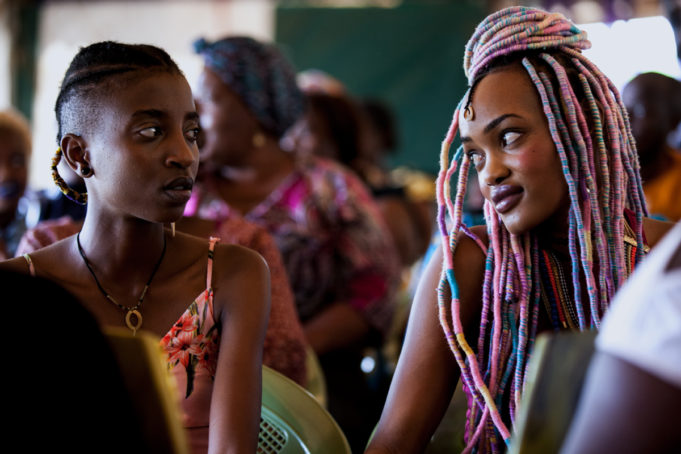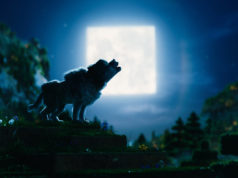You probably know that Rafiki is the name of the mandrill / high priest in The Lion King, but if you have a passing knowledge of Swahili, you know that it means “friend” in that language. It is also the title of the Kenyan lesbian romance that plays at the Grand Berry Theater during the venue’s opening week. Even if it weren’t a landmark LGBT film, it would still be worth seeing just for its African story unfiltered by a Western sensibility.
Adapted from Monica Arac de Nyeko’s Ugandan-set short story “The Jambula Tree,” the plot centers on Kena Mwaura (Samantha Mugatsia), a teenager in the Slopes neighborhood of Nairobi who plays soccer with the boys and wears her hair in short cornrows that I would want if I were a trim black girl. She mostly speaks Swahili to her friends and English to her bitterly divorced parents (Jimmy Gathu and Nini Wacera). She harbors a crush on Ziki Okemi (Sheila Munyiva), another Slopes girl with pink dreads and a desire not to be a typical Kenyan housewife pumping out babies, but reminders of the hostile climate for gays are everywhere. Kena’s male friends throw around gay slurs casually in private conversation, and more than casually at Tom (Vitalis Waweru), a local man with a reputation for homosexuality, who keeps showing up with new bruises and injuries. The Christian pastor (Githae Njogu) spews hate from the pulpit, and the cops stand back and laugh when gay people are beaten inside the police station. If that’s not enough, Kena and Ziki’s fathers are running against each other for national political office. Still, with all this going on, these girls find love with each other for a moment.
Right now, we’re seeing LGBT films from nations where homosexuality can get you killed, either by the government or by a spontaneous mob uprising — others floating around out there include Bogdan Olteanu’s Several Conversations About a Very Tall Girl (Romania), Álvaro Aparicio’s Retablo (Peru), Blerta Zeqiri’s The Marriage (Kosovo), Shelly Chopra Dhar’s Ek Ladki Ko Dekha Toh Aisa Laga (India) and Levan Akin’s And Then We Danced (Georgia). Rafiki had troubles in its own country, being initially banned from theaters until a lengthy legal battle ended with Kenya’s supreme court lifting the ban for a single week, during which the film sold out theaters in the nation’s capital. Despite this and the film becoming the first Kenyan movie ever to be selected for the Cannes Film Festival, the government still refused to submit it for consideration to last year’s Oscars.
Maybe Rafiki wouldn’t have beaten out Roma for the statuette last year, but director/co-writer Wanuri Kahiu is an experienced filmmaker who helmed five films before this became the first one of hers to reach American audiences. She knows when to slow things down for a romantic interlude and when to turn up the energy. (The Kenyan pop songs by Muthoni Drummer Queen on the soundtrack are good for the latter.) The bright colors of Nairobi’s streets pop off the screen, and the editing is as professional as any American independent feature. There’s little fat in this 78-minute film, and Kahiu knows the power of understatement, as in a late wordless scene between Tom and Kena. The acting suffers from moments where the inexpertise shows, yet newcomer Mugatsia possesses a striking face, and you won’t soon forget the look of smoldering anger on it when Kena’s mother holds her down at church while that pastor tries to exorcise the demons of lesbianism from her. Before this week, there would have been little hope of seeing this in a Fort Worth theater. Thanks to the Grand Berry, now we have that chance.
Starring Samantha Mugatsia and Sheila Munyiva. Directed by Wanuri Kahiu. Written by Wanuri Kahiu and Jenna Bass, based on Monica Arac de Nyeko’s short story. Not rated.












